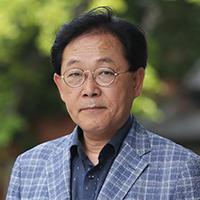
By Yang Keeho
Professor at Sungkonghoe University
With Japanese Prime Minister Shinzo Abe announcing his resignation last month for health reasons, Japanese Chief Cabinet Secretary Yoshihide Suga is most likely to take over as Japan's next leader. In an interview with the Japanese daily Sankei Shimbun on Sept. 5, Suga said, "The basis of Japan-Korea relations is the 1965 Japan-Korea Claims Agreement." He thus implied that even with a new prime minister, bilateral ties and Tokyo's stance will not change.
Suga is expected to concentrate on building trust between himself and the new U.S. leader after the American presidential election on Nov. 3. This also suggests how difficult it might be to improve Korea-Japan relations. Given various circumstances, Japan, despite having a new leader, and Korea could struggle to share strategic benefits from the perspective of government policy. This is because the two countries are clashing on many topics such as strategy toward North Korea, the issue of "comfort women," or women forced to provide sex to the Japanese military before and during World War II, and Japan's mobilization of Koreans for forced work before and during the war.
Bilateral conflict and pursuit of breakthrough
A major point of bilateral contention is reparations for Korean victims of Japan's forced work program before and during the war. A Japanese company that exploited such labor has balked at paying individual compensation, so with the Aug. 4 expiration of the public notice of a Korean court's ruling, the Korean judiciary will seize the company's Korea-based assets for use in paying reparations. If Seoul and Tokyo fail to reach a diplomatic solution and if the seizure of the company's assets proceeds, both sides will face a huge burden. Other hurdles include Japan's export curbs on Korea and the fate of the bilateral General Security of Military Information Agreement. To avoid catastrophe, a wise and sensible approach is required.
First, Tokyo must accept the reasonable proposal related to the forced work issue from Seoul. Following the Korean Supreme Court's verdict, the proposal suggests that after the Japanese company compensates individual victims, Korean corporations and the Korean government will make up for the losses. This move will ensure implementation of the Korean verdict while protecting Japanese companies from substantial damages. This proposal from Seoul can be seen as a rational way to serve both the justification and practical interests of both countries. Moreover, it can satisfy Tokyo's demand to prevent Japanese companies from incurring substantial damage. Another plan is to set up a compensation fund that Seoul participates in to respond to additional lawsuits in Korea and verdicts in favor of the victims.
Second, the Korean government needs a more aggressive policy toward helping Koreans who were forced to work by Japan. Seoul must form a social dialogue organization that includes the victims to pursue a breakthrough through participation in the process of fact-finding, remembrance and comfort, and tribute as well as in taking compensatory measures. This process must also include not only forced workers but also the "comfort women," Koreans forced to move to Sakhalin Island and victims of the atomic bombings in Japan.
Need to widen mutual understanding
To mark the 55th anniversary of Korea-Japan relations this year, both countries must advance official ties, public diplomacy and private exchange to narrow the gap between both government and the people. This is especially crucial for tackling policy toward North Korea and the issues of the "comfort women" and forced work victims. The two countries need to exercise tolerance and patience by putting themselves in each other's shoes to hold candid conversations and communication on each of these issues.
When it comes to policy toward the North, Koreans must understand that the Japanese are the only people in the world to suffer an atomic bombing and thus feel a sense of crisis over the North's nuclear program and missiles, and are sensitive toward Pyeongyang's past abductions of Japanese citizens. On the other hand, the Japanese must understand the Moon Jae-in administration and the Korean people, who live in the world's only divided country and have pursued the building of a peace structure on the Korean Peninsula while gradually pursuing denuclearization.
On history and related issues, the Japanese must understand the separation of the legal, administrative and judicial branches of the Korean government, the legally binding verdict of the Korean Supreme Court, the right of individual victims of forced work to seek legal justice through lawsuits for more than 20 years and the reality of a plethora of voices within Korea, a democratic country.
The Korea-Japan conflict over history issues should not absorb Northeast Asia, whose overall political atmosphere is too grave. The result of the U.S. presidential election in early November will greatly affect both Korea and Japan. No matter who the next U.S. leader is, risk related to China will remain and the Sino-U.S. conflict will worsen. If this is the case, Korea and Japan must shoulder an enormous burden in politics, economy and national security.
For this reason, a trilateral summit of Seoul, Beijing and Tokyo slated for late November in Korea offers a crucial diplomatic opportunity for cooperation. The three nations will discuss and possibly agree on issues such as support by their leaders for next year's Tokyo Summer Olympics and the 2022 Beijing Winter Olympics, peaceful resolution of the Korean Peninsula issue, trilateral cooperation for fighting COVID-19, forming fast-track procedures for business and research personnel from the three countries, and acceleration of business cooperation by signing a three-way free trade agreement. Thus a plethora of agreements on mutually beneficial agenda is possible.
Noted Israeli historian and bestselling author Yuval Noah Harari said, "We must be aware that we are now facing not just a health-care crisis, but also a political crisis," adding that COVID-19 has caused a storm in world politics, economy, society and culture that is proving to be a global challenge. Korea's strengths lie in its civic capacity and social solidarity, not totalitarian supervision. Japan shares Korea's advantages of market economics and free democracy. Considering these merits, both countries must share cooperative and strategic choices in tackling issues like COVID-19 and the Sino-U.S. conflict. Seoul and Tokyo must seek a global cooperation structure so that the results of bilateral collaboration serve as a political and diplomatic safety valve amid the insecure geopolitics of Northeast Asia.
Professor Yang teaches Japanese studies at Sungkonghoe University in Seoul.
Translated by Korea.net staff writer Yoon Sojung.
Most popular
- 2 Egyptian sisters reflect on 10 years as Honorary Reporters
- Actor Bae Doona's first romcom in decade to hit theaters in May
- Korea Welcome Week for foreign tourists set from April 25-May 16
- Korea.net welcomes 2025 K-influencers, Honorary Reporters
- Mini-exhibition brings Korean culture to South London town
